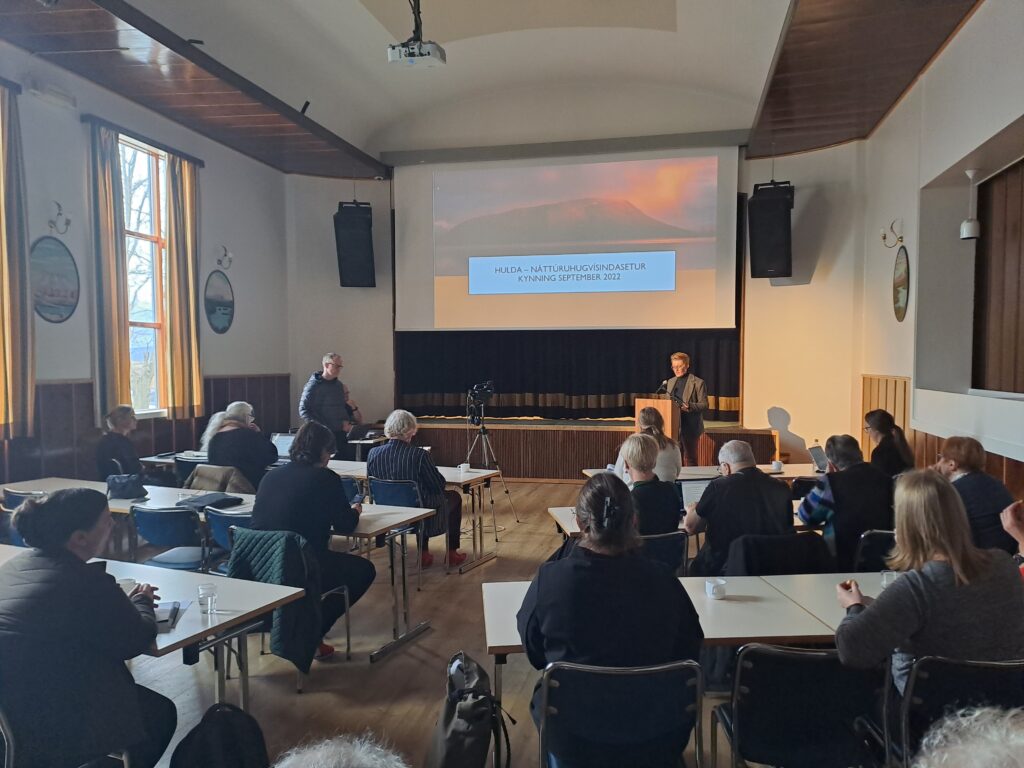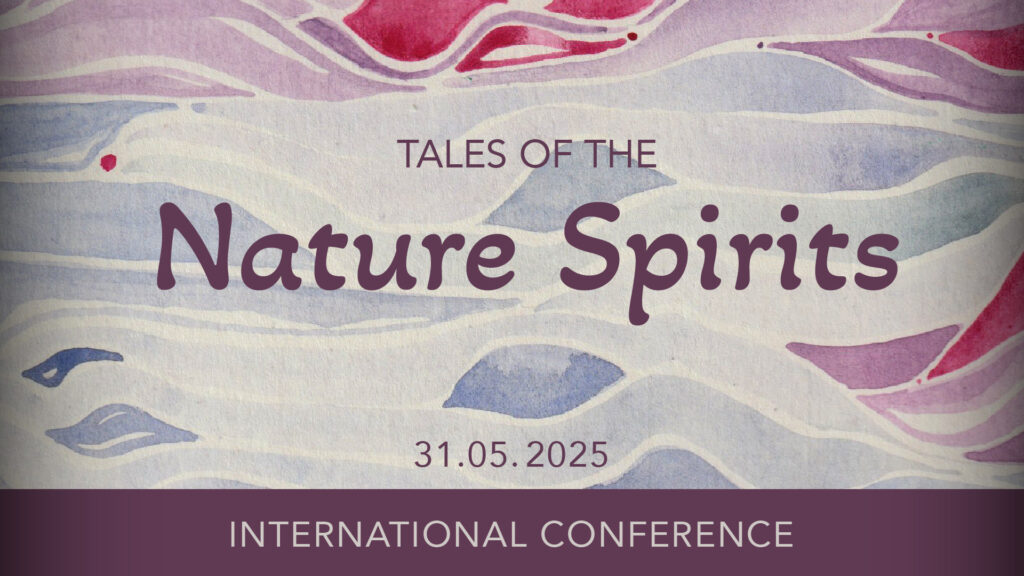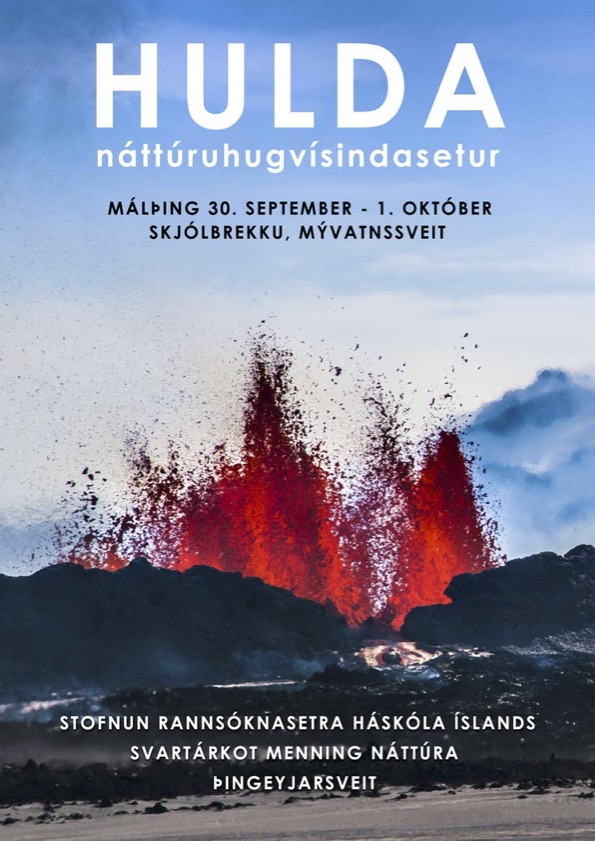Viðburðir

Ég ferðaðist um firnindin og klungur
á fjallaslóð
við augum blasti urð og jökulsprungur
og auðnin hljóð.
– Iðunn Steinsdóttir
2025
Maí
Tales of the Nature Spirits
The international conference “Tales of the Nature Spirits” will be held on May 31st, 2025, at Hof Cultural Center in Akureyri and will be followed by a workshop on June 1st, in Akureyri University’s Sólborg Hall. The conference will be held in English. The goal is to enrich and deepen our understanding of the cultural heritage that entails Elves, Huldufolk, and other nature spirits. At the same time, it’s an opportunity to create and inspire collaboration and research in tourism, art, and culture.

On the day of the conference on May 31st. The program starts at 9:30 am and finishes at 15:00. The lecturers come from Iceland, the United States, England, Mongolia, Kenya and the Czech Republic. All the lecturers have in different ways worked with intangible cultural heritage and the artists participating all share the wish to increase the uniqueness of Iceland regarding the collection and protection of sources and tales of nature spirits, along with our perception of the country that has inspired our art through the centuries and continues to do so.
During the workshop on June 1st, starting at 10:30 until 12:30 in the Sólborg festive hall of Akureyri University, multiple issues will be discussed in English and Icelandic and lecturers will lead discussions and conclusions. During the workshop, the participants will be encouraged to continue their work and collaboration regarding preserving sources that entail Elves, Huldufolk, and other nature spirits. A report, built on the day’s findings, will be published in the mainstream media both in and outside of Iceland.
Moderator:
Huld Haflidadottir, founder of Spirit North and STEM Husavik.
Entertainment:
Gefjun group “stand up”.
Information:
Hof Cultural Center opens at 9:30 and closes at 16:00.
The conference starts at 9:45 and finishes no later than 15:00.
Each lecture takes about 25 minutes.
There will be time for discussions over morning coffee and lunch.
Workshop on June 1st from 10:30 to 12:30 at the Akureyri University Sólborg hall
What is included in the conference fee:
Conference in Hof Cultural Center, Hamraborg hall on 31st May, morning coffee and
lunch: Vegan soup and bread. Workshop on June 1st, morning coffee.
Tickets
https://www.mak.is/is/vidburdir/international-conference-tales-of-the-nature-spirits
More info
huldustigur.is
Lectures
Looking for the Hidden Folk
Nancy Marie Brown
This presentation is based on Nancy Marie Brown’s most recent book, Looking for the Hidden Folk, published in 2022. The first time she came to Iceland, in 1986, she felt she had found a piece of herself. She could not begin to explain what she was feeling until the summer of 2016, on her 21st trip to Iceland, when she took a walk with an elf-seer: Ragnhildur Jónsdóttir.
Nancy Marie Brown is the author of several highly praised books of nonfiction based on the Icelandic sagas, including The Far Traveler, Song of the Vikings, Ivory Vikings, and The Real Valkyrie. For twenty years, she worked as a science writer and editor at Pennsylvania State University in the US. As a writer she asks, what have we overlooked? Whose stories must not be forgotten?
__________________________
Collaboration with more-than-human
Daria Testo
More-than-human collaboration is intrinsic to Indigenous Knowledge. Kindred lecture will discuss the growing necessity and examples of more-than-human narrative in artistic endeavors.
Daria Testo is a Buryat-Mongolian (Hori Buryad) Indigenous curator and storyteller, deeply engaged in amplifying marginalized and more-than-human perspectives through her decolonial lens. Her practice is anchored in the preservation of both tangible and intangible heritage, where Traditional Ecological Knowledge (TEK) and Indigenous Knowledge serve as guidance. Reflecting upon the oral and written knowledge of her ancestors, she contemplates the notions of reciprocity, local cosmologies, such as folkloristics and myths, and the value of kin-making. Daria is interconnected with humans, more-than-humans, other-than-humans and non-humans.
__________________________
Planting Portals: Working with Place as a co-creator
Galadriel González Romero
In the autumn of 2023, Galadriel began a collaboration with a patch of soil from the Akureyri Botanical Garden to create an álagablettur (from Icelandic folklore: enchanted spot), and a portal into the past and future. This ongoing project has been evolving as other beings, both from the garden and beyond, have joined in this act of folkloremaking. In this lecture she will introduce the term ground-responsiveness as a methodology for collaborating with a place. Ground-responsiveness, a term she
developed as an alternative to “site-specific” art, can be applied across various fields. Rather than viewing the land as a static backdrop, it positions place as a living ecosystem with which we co-create. Through the story of her collaboration with Akureyri’s soil, the hidden woman Pía, and other beings, Galadriel will explore the importance of listening to and connecting with the spirits of the land when working ground-responsively, while also looking into practical and ethical aspects of collaboration with the
more-than-human.
Galadriel González Romero is a Kenyan-raised multicellular organism, visual artist, rights of nature activist, and researcher investigating ethical collaboration with the more-than-human and ecosystemic approaches during our climate apocalypse. She has a BA in Fine Arts from Stellenbosch University followed by a MFA from Listaháskóli Íslands.
__________________________
The Hidden Nation of Iceland
Inga Lísa Middleton
Photographer and filmmaker Inga Lísa Middleton will discuss how Icelandic folklore and the belief in elves, trolls and hidden people have manifested in Icelandic society, and how its influenced its culture and the arts from the time of the first settlers.
Inga Lísa studied at the University for the Creative Arts and the Royal College of Art in the UK. Her B.A. thesis, The Hidden Nation of Iceland—A Mythological Study, was inspired by her grandmother’s tales of the hidden folk. Inga Lísa’s photographic works have been exhibited widely in recent years, including in London, Paris, Tokyo, Copenhagen, and Reykjavík. She has written, directed, and produced TV shows and short films, which have been screened and distributed internationally and won numerous awards.
__________________________
The Benefit of Sensing the Nature
Bryndís Fjóla Pétursdóttir
How can the general public retain the sense of listening to nature for their own benefit. How to enhance the imagination and how the wisdom of the hidden world can inspire methods and solutions in tackling urgent issues such as the effects of climate in our time.
Bryndís Fjóla is an Icelandic horticulturist and seer, elf whisperer, she is the founder and owner of Huldustígur ehf. Bryndís Fjóla directs all her projects from Akureyri, with focus on education and general knowledge about the intangible cultural heritage related to huldufolk, elves, trolls, mermaids and dragons. She gives talks, presentations and leads collaborative and international projects and workshops for schools, non-profit organizations around the country and abroad.
__________________________
“There are things that no man can conquer” Wilderness as a Catalyst of the Supernatural Experience in Michael Crichton’s Eaters of the Dead (1976)
Jindřich Pastorek
The concept of “wilderness” continues to occupy a prominent position within Beowulf scholarship (D. B. Ellard 2024, 259). A key element of the plot and the setting in the original epic, “wilderness” has consequently played a central role in the numerous adaptations, both in the visual medium and prose. Among these, Michael Crichton’s Eaters of the Dead (1976) is particularly noteworthy. Primarily a sci-fi author, Crichton reiterates the narrative of Beowulf using the conventions of science fiction with a pronounced formal and thematic emphasis on the mechanisms of construction and representation of the colonial other and its implications for human interaction with nature. This paper argues that within context of this SF retelling of the epic, “wilderness” drives the novel’s indigenous characters to accept the unnatural phenomena – that is, phenomena inexplicable “by the known laws governing the physical world” (Doležel 1998, 116) – that populate it as supernatural, or subject to a set of principles separate to “the known laws governing the physical world.” This is contrasted with the novel’s character-narrator, who unsuccessfully attempts to integrate them into this framework of “known laws” using the conventions of SF. It is further argued here that this supernatural experience enables the characters’ continued survival within a space that would otherwise pose lethal danger.
Jindřich Pastorek is a graduate student at the Department of English and American Studies at Palacký University Olomouc. His research interests mainly include bridging traditional and contemporary theoretical approaches to fantastic literature with eco-criticism and post-classical narratology to describe and systematize the variability in which the inexplicable is conceptualized.
__________________________
How to build a troll chair and other pest control hacks – the return of folkloric creatures in Icelandic ecofiction
Auður Aðalsteinsdóttir
Auður Aðalsteinsdóttir PhD in comparative literature, director of The Research Centre of Environmental Humanities, Þingeyjarsveit, University of Iceland, will discuss how trolls, ghosts and other paranormal beings that keep popping up in Icelandic contemporary literature and art, with obvious references to folklore, continue to highlight the discomfort people experience in regards to our entanglements with the non-human. In this paper, examples of such reworkings of Icelandic folklore are studied in the light of theories claiming that stories of cohabitation with paranormal creatures reflect a more ecologically friendly attitude towards our environments and other beings than stories of their extermination or exorcism.
_________________
The Power of the Unseen and the Limits of Reason
Ole Martin Sandberg
Ole Martin Sandberg is a philosopher at the University of Iceland where he teaches environmental ethics. Here he will talk about the limits of philosophical or rational analysis in the quest to justify moral foundations and encourage passionate commitments and actions. Ultimately, critical rational arguments do not provide a solid foundation for moral commitments. A moral attitude has to be grounded in a felt sense that life and nature have meaning and are worth of respect. This is a form of spirituality that is often associated with animism. We do not have to look to indigenous people in foreign places to find animist practices; we have traces of it here in our own culture, for example in the Icelandic practice of consulting the hidden people before making a decision that would destroy a landscape. Hidden people and other unseen forces remind us of the limitations of our knowledge and our control and that we do wisely by treading carefully when dealing with nature.
_________________
_________



